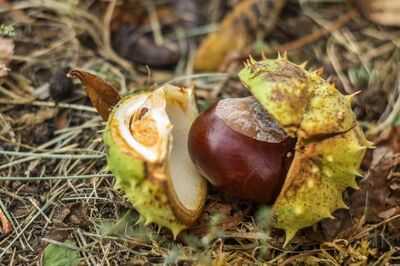As autumn sets in, parks look more scenic than ever - making it the perfect backdrop for long dog walks with a warm drink in hand. But in a recent warning, one dog expert has shared that this time of year can cause chaos to our four legged friend's health if we're not careful.
Sean McCormack, head vet at Tails.com, shared insights on the real risks you can come across this season - including conkers and otherautumnal hazards dog owners should look out for. He said: “Autumn is a beautiful time of year, but with the change in season comes a shift in foliage and natural growth, some of which can pose risks to dogs. As pet owners, it's important to remember that certain plants, flowers, and crops that thrive in autumn may be harmful to our animals.
“Dogs are naturally curious, and because they explore the world through their nose and mouth, encounters with toxic substances are unfortunately quite common. Knowing what to keep your dog away from is key to keeping them safe, and avoiding an unnecessary visit to the vet.”
Conkers and acornsThe head vet shared that these often fall from trees between September and November and while they may be a tasty snack for squirrels and other wildlife, but they do pose health risks for dogs. He added: “Many dog owners aren’t aware that chewing or swallowing these can cause gastrointestinal upset, including vomiting, diarrhoea, abdominal discomfort and lethargy.
"Occasionally, dogs may also develop a rash or swelling around the mouth or eyes. Symptoms often appear within one to six hours of ingestion, though in some cases they may be delayed by up to 48 hours. You might notice pieces in your dog’s vomit or stool."
The expert shared that the best way to stop this from happening is to keep a close eye on them during walks. If you think your dog may have eaten an acorn or conker, it’s important to contact your vet for advice as soon as possible.
Fallen fruitDo you know that some fruits can be harmful to your dog? Sean explained: “During autumn, fruit that hasn’t been picked often falls to the ground, and it’s only natural for dogs to want to investigate.

"However, owners should be aware that certain fruits, including apples, plums, and other stone fruits, can pose health risks to pets. “In particular, it’s the stones or cores that can cause problems."
If ingested, they may lead to symptoms like:
- dizziness
- breathing difficulties
- vomiting
- diarrhoea
- signs of shock
The expert added: “If you have fruit trees in your garden, it’s a good idea to regularly check for and clear away any fallen fruit. Fermenting fruit can also produce alcohol, which some dogs are highly sensitive to, potentially resulting in severe gastrointestinal upset.”
Slugs and snails
Warning owners about more health risks, he said that dogs typically become infected with lungworm when they come into contact with slugs or snails, often while sniffing around in gardens, parks, or woodland areas. If you are unaware, lungworm is a parasite that lives in the heart and blood vessels of the lungs. If left untreated, it can cause serious health issues, and in some cases, may prove fatal.
In fact, “autumn is a high-risk season for lungworm", he said. The reason for this is because "slugs and snails are more active due to damp conditions. While the greatest risk comes from a dog eating a slug or snail, either accidentally or on purpose, infection is also possible through contact with their slime trails.
“Younger dogs and puppies are especially vulnerable, as they’re more likely to explore the environment with their mouths. But older dogs aren’t immune either, particularly if slugs or snails have crawled over their food or water bowls.”
Rodent poisonIn his fourth and final tip, he suggests that people need to be careful where they lay traps or poison. Rats and mice tend to breed during the warmer summer months, which means infestations are more likely to occur in autumn.
The vet explained: “As a result, many people turn to rodent poisons, but these substances are highly toxic to dogs. If a dog ingests even a small amount, the consequences can be serious, and symptoms will vary depending on the type of poison involved."
Common signs of poisoning include:
- lethargy
- breathing difficulties
- pale gums
- coughing
- vomiting that may contain blood
- bloody nose
- swelling under the skin
- bleeding from the gums
“If you suspect your dog has come into contact with rodent poison, contact your vet immediately," Sean concluded.
You may also like

Inside Christian Brueckner's flat where Madeleine McCann suspect was holed up

People only just realising what 'Nokia' brand name actually means

Bank Holiday Alert: Banks to Remain Closed in Several States on Monday, Check RBI's Updated List

US investigation not to impact investment plans: Waaree Energies

Gold Price Today: 24-Carat Gold Jumps ₹3,330 in a Week, Latest Rates in 10 Major Indian Cities







